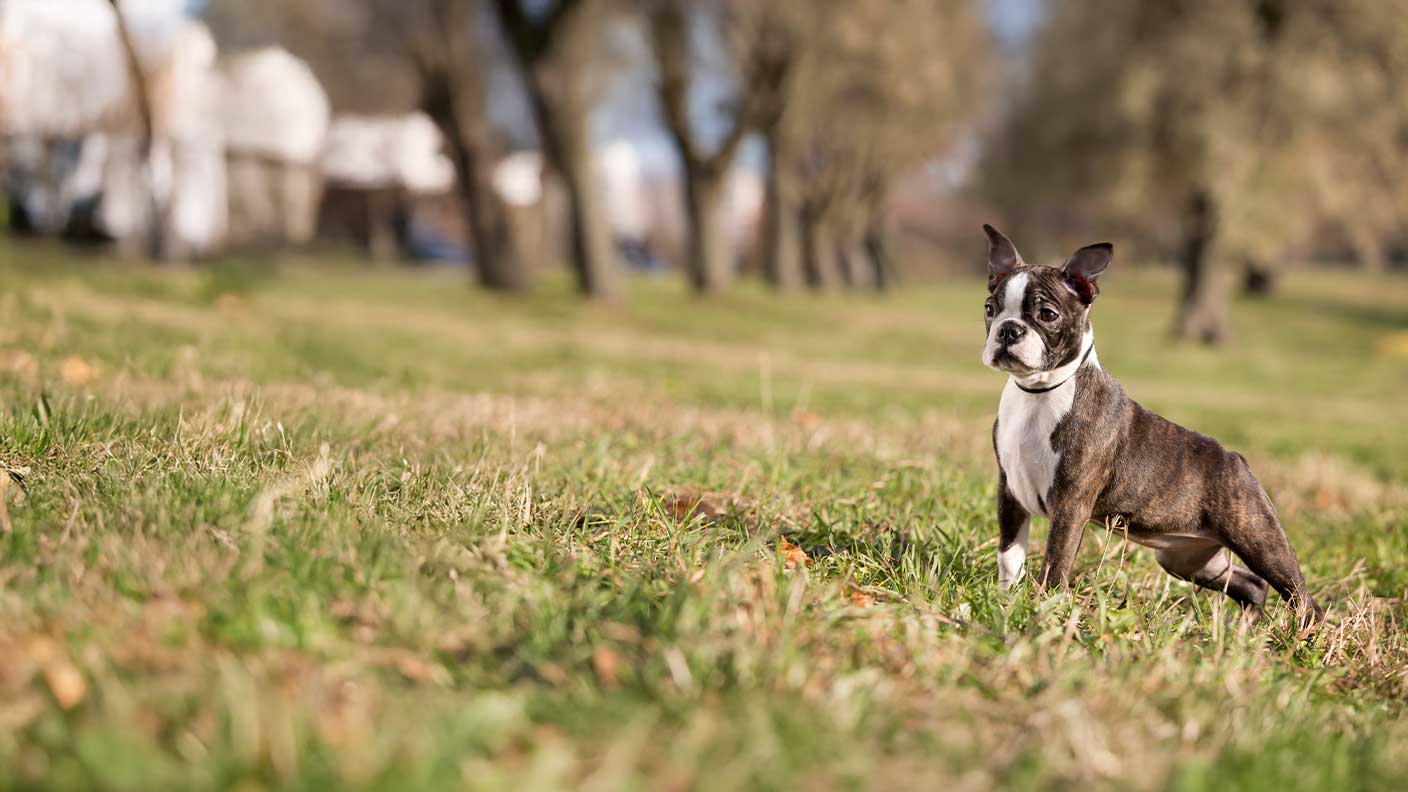Boston Terrier dog breed information and advice
Sometimes confused with French Bulldogs, Boston Terriers are compact little pups with big eyes, classic tuxedo markings and big personalities. Originally bred in the United States, the Boston Terrier first made it to British shores at the beginning of the 20th Century and have been with us ever since.
This dog breed guide will give you information on how to care for a Boston Terrier. Including the breed size, colours, temperament as well as common Boston Terrier health issues to be aware of.
Boston Terrier facts

| Lifespan | 13 – 15 years |
| How much | £1,400 – £2,000 |
| Size | 38 – 43 cm |
| Weight | 4.5 – 11.5 kg |
| Colours | Black & white, brindle & white, seal & white |
| Grooming | Once a week |
| Temperament | Lively, friendly and strong-willed |
| Exercise | Under an hour a day |
Pet insurance for your Boston Terrier
Injury and illness can happen to any dog at any age. Dog insurance could help to cover the cost of consultants, treatment, medication or surgery.
Pre-existing conditions are not covered, so get cover for your Boston Terrier as soon as you can with puppy insurance.
Some health conditions are more common in some breeds than others. Here are some potential Boston Terriers health conditions to be aware of:
Sainsbury’s Bank Pet Insurance
Sainsbury's Bank Pet Insurance will cover your Boston Terrier puppy from eight weeks old.
At Sainsbury’s Bank you can choose between three different cover options:
- Lifetime cover is the most comprehensive option, with up to £10,000 towards vet fees each year.
- Maximum benefit offers cover for illness, accidents and conditions up to £6,000.
- Time limited cover covers your Boston Terrier dog with vet costs for short-term health conditions of up to £3,000, or for 12 months.
Please note, we won't cover any pre-existing conditions. Terms, conditions, excesses, exclusions and limitations apply.
How to care for a Boston Terrier
Your dog’s health will be affected by their diet, exercise, training and grooming. Regular vet health checks will help to pick up on any health issues early on. Here’s some things to know before preparing for your new dog:
Feeding and nutrition
If you have a puppy, they should be fed three to four times a day, but as they get older decrease to two. Follow the guidelines on the packaging to work out how much food your dog needs a day. You can include dog treats in your dog’s diet, but make sure you don’t go overboard. Too many treats will cause your dog to become overweight – so resist those puppy eyes.
Grooming
Boston Terriers have a short smooth coat that requires weekly grooming. You might think this means that they don’t need bathing often, but that’s not always the case. How often you bathe your dog will depend on how quickly they get dirty or smelly. If your dog starts to smell or itch, then it’s time for a bath. You can either bath your dog at home or take them to a professional dog groomer.
Exercise
Generally, Boston Terriers need under an hour’s exercise a day. This can be split into two walks. They’re a lively breed that loves to run around off lead, just make sure your dog is in a safe area before letting them off.
Your dog will love to play games and should always have toys within reach. If they don’t have a toy, they are likely to chew on something else. They don’t mind if it’s a shoe or a table leg. They have strong jaws, so chew ropes and hard rubber toys suit them best.
Training
Boston Terriers are intelligent, but they also have a stubborn personality. This can make training tricky. You’ll need to be patient with your dog and remember that repetition is key. Training classes are a great place to pick up tips for successful training and they give your dog the chance to socialise with other dogs.
House training is easier with a puppy than an adult dog. The sooner you start puppy toilet training, the quicker they will learn. To toilet train your dog, you’ll need to give your dog lots of chances to go to the toilet outside. Reward your dog when they successfully do their business outside.
Temperament and behaviour
Many people mistake the Boston Terrier for a French Bulldog as they look similar. Both breeds have short noses and pointed ears, but Boston Terriers have longer legs and a less muscular build.
The Boston Terrier personality is similar to that of a French Bulldog, and they have a gentle temperament. Their signature characteristics include being affectionate and lively, making them great companions. They are more active than French Bulldogs and will have sudden bursts of energy. Your Boston Terrier will enjoy running around and playing fetch.
Common health problems
It’s important to know the common health problems linked to Boston Terriers. Taking out pet insurance earlier may help if your Boston Terrier gets one of these health conditions:
Dystocia
This term refers to any difficulties in giving birth - the cause could be fetal, maternal or a combination.
There is a large mismatch between the size of the pup and the birth canal of the mother, so a vet will need to assist with the delivery of the puppies – 92% of Boston Terrier pregnancies need to be caesarean.
Hereditary cataract
If your dog has a cataract, you’ll notice a cloudiness of their eye. The clouded lens causes vision loss and can affect one or both eyes. Your vet will carry out tests to determine the stage of development and what form of cataract it is. Surgery may be recommended to prevent complete blindness.
Luxating patella
Luxating patella refers to the incorrect alignment of the kneecap. Where a normal kneecap slides into a groove, a luxating patella will jump out of the groove, causing pain and locking the leg in place. The affected dog will hop on one of the back legs, holding the affected leg up. If your dog has a luxating patella it will need surgery to realign the kneecap. This involves making the groove deeper so that the kneecap slides in easily. An untreated dog can become lame and will be in pain.
Cleft palate
Cleft palate is an inherited condition, and most common in purebred puppies. It’s most seen in brachycephalic breeds – like bulldogs and Boston Terriers.
The palate is the roof of your dog’s mouth, and a cleft palate is an opening in the middle of the palate.
A cleft palate can usually be detected by looking at the puppy. Affected puppies may struggle with:
- Suckling and swallowing
- Poor growth
- Facial deformity
- Aspiration pneumonia
Most cases require surgical correction.
So, is a Boston Terrier right for you?
This friendly Boston Terrier breed would be well suited to you if you’re looking for a playful companion. They’ll keep you entertained with their bursts of energy, but you’ll need to have patience when it comes to training.
Frequently asked questions
Are Boston Terriers healthy?
There are health issues linked to short-nosed dogs and small dog breeds, and the Boston Terrier is no exception. They are considered generally healthy but there are some health problems that you should be aware of, like luxating patella and dystocia.
How big do Boston Terriers get?
It’s difficult to know exactly how big your Boston Terrier will get, but they generally grow to be around 38 – 43 cm tall and should weigh 4.5 – 11.5 kg. They’ll reach their full height by the time they are 14 months. Their weight will depend on their diet and exercise. Make sure you weigh their food to stop them from being over or underweight.
How long do Boston Terriers live?
Boston Terriers have a lifespan of 13 – 15 years. Your dog will have the best chance of meeting this life expectancy if they receive the correct health care. Diet, exercise, health check-ups and grooming all play an important part in your dog’s health.

Browse our guides
Choose from our list of helpful guides and information

Explore dog breeds
Find out how to keep your dog healthy and happy

Cat breed guides
How to care for your cat, common health problems and more
Terms and conditions
Important information
Sainsbury's Bank plc, Registered Office, 33 Charterhouse Street, London, EC1M 6HA (registered in England and Wales, no 3279730) is authorised by the Prudential Regulation Authority and regulated by the Financial Conduct Authority and the Prudential Regulation Authority (register no. 184514).
Sainsbury's Supermarkets Ltd is an appointed representative of Sainsbury's Bank plc. Sainsbury's Bank plc acts as an introducer to Pinnacle Insurance Ltd who is authorised by the Prudential Regulation Authority and regulated by the Financial Conduct Authority and the Prudential Regulation Authority (register number 110866). Registered office: 4th Floor, Limelight, Elstree Way, Borehamwood, Hertfordshire, WD6 1JH. Sainsbury’s Bank Pet Insurance is arranged, administered and underwritten by Pinnacle Insurance Ltd. Sainsbury's Bank plc and Pinnacle Insurance Ltd are not part of the same corporate group.
We do not provide personal recommendations to customers.
